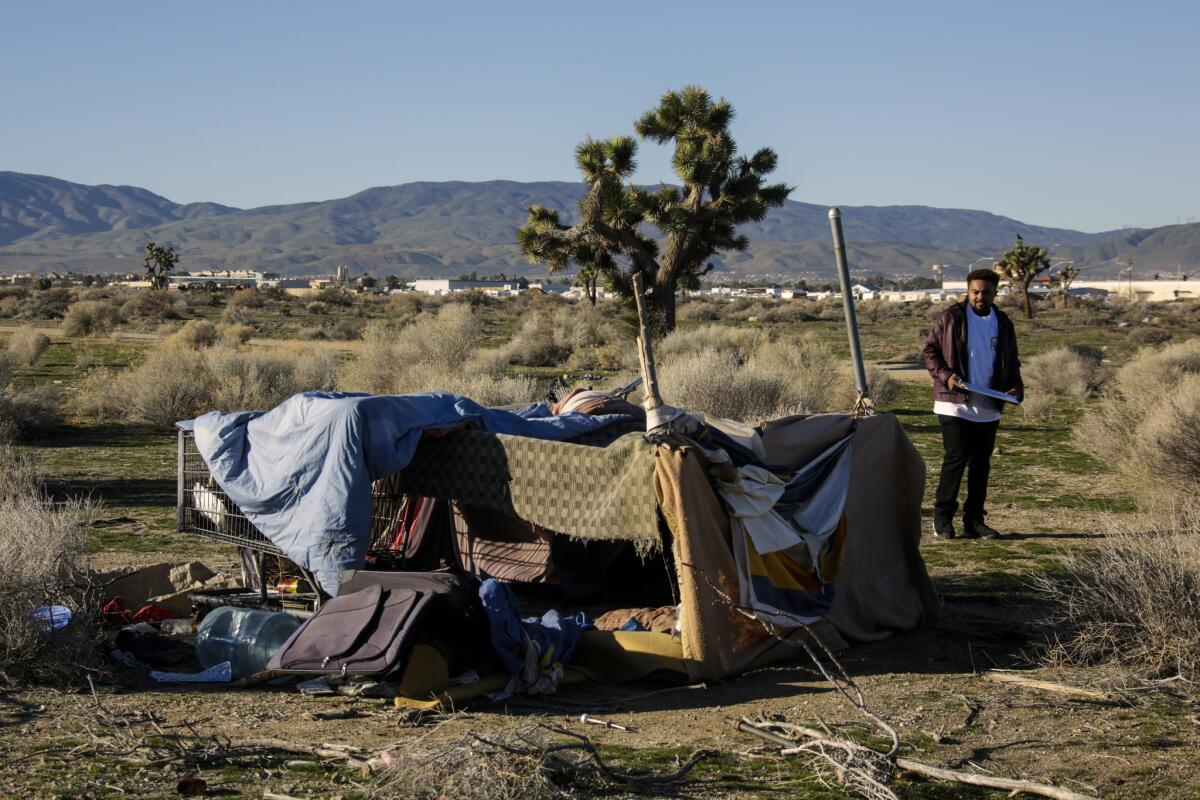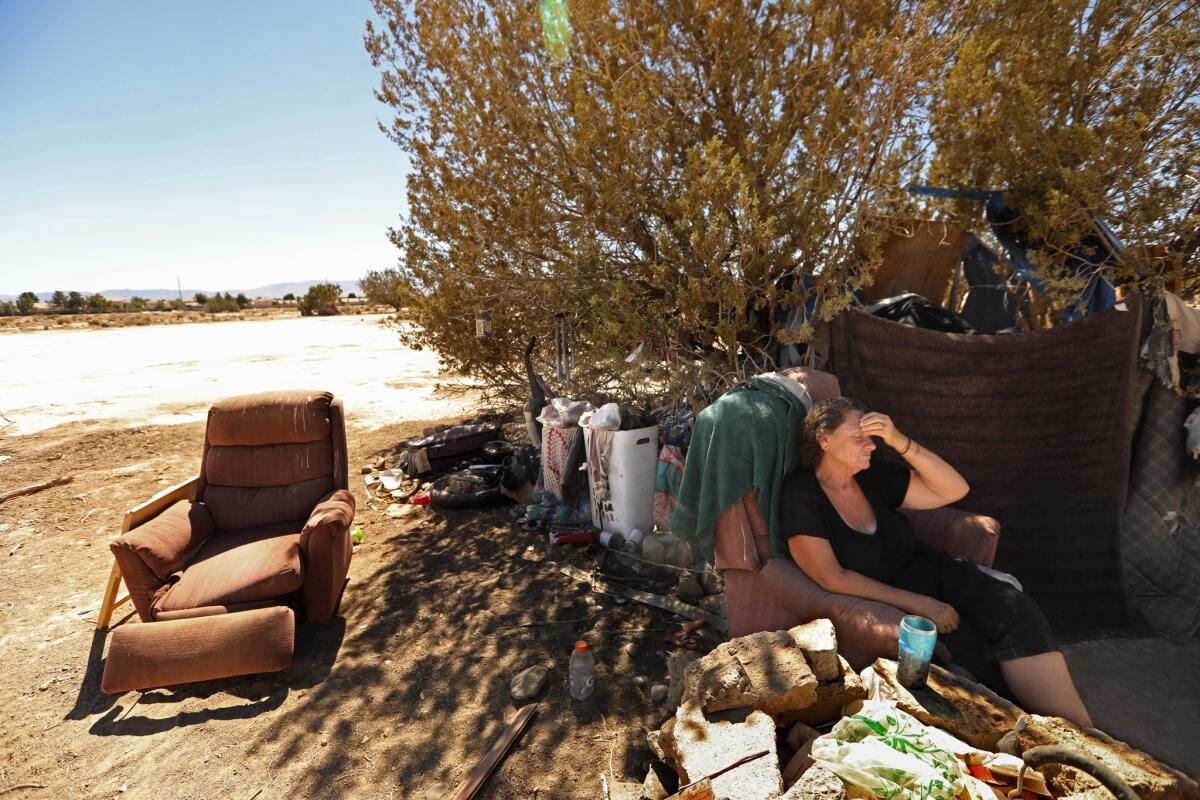Lancaster wants to clamp down on groups feeding homeless people

Hours into a contentious Lancaster City Council meeting this week, Pastor David Cowan stepped to the lectern.
The Antelope Valley city had proposed changes to the Municipal Code that would sharply restrict how charitable groups like his church could feed homeless people in public spaces.
This angered good Samaritans like Cowan, who spent the meeting criticizing the proposal as officials including Mayor R. Rex Parris tried to quiet audience members by threatening to eject them if they spoke out of turn.
“When we see a person who has need, it’s our responsibility to take what they need to them,” Cowan said as cheers went up during the four-hour meeting, which was often contentious. “I have to go where the need is. The need might be up under a bridge. The need might be in a brook. The need might be anywhere.”
Speaker after speaker voiced similar complaints about the measure.
Through the years, cities and counties across the country have instituted restrictions similar to those proposed in Lancaster. The National Law Center on Homelessness & Poverty recently surveyed 187 cities across the country and found that 9% had some form of a ban on food sharing, an increase from when it last researched the subject in 2016.
Last year, El Cajon instituted and then pulled back a ban on feeding homeless people amid a hepatitis A outbreak. In that San Diego suburb, 12 people were cited for violating the ban.
After the outcry in Lancaster, the City Council led by Parris — the city’s longtime outspoken mayor — postponed a vote on the proposal. But he insisted the council would revisit the measure soon in order to bring more structure to how food is distributed to homeless people.

Parris said officials would take some time to study the issue and then come up with a new plan.
The version of the ordinance that was shelved would have required volunteer groups to get permits to set up shop in certain parts of public parks, pay rental fees and get a certification from the Los Angeles County Department of Public Health.
Proponents of the measure said they worry about food-borne illnesses that could stem from these drives and mounds of trash that could be left behind. The 2019 Los Angeles County homeless count found just under 3,300 homeless people living in the Antelope Valley, which includes Lancaster and Palmdale. That was up 3% from 2018.
The City Council meeting “wasn’t a good image, I’ll give you that,” Parris said. “We’re waiting for a disaster to occur when you have hundreds of people being served food out of the same pot without any supervision whatsoever, oftentimes in the desert or in a park.”
Opponents of the proposal say it’s merely another way to criminalize homelessness. They also criticized the ways in which Parris has spoken about homeless people in the past. After the homeless count came out this year, Parris said residents should arm themselves against violent homeless people.
The city will soon open a facility that will include about 100 units of permanent supportive housing in addition to bridge housing.
Advocates say Lancaster has already been an inhospitable environment for homeless people as a result of overly broad ordinances against loitering and panhandling.
This proposal goes a step further.
Ruth Sanchez, 45, lives in neighboring Palmdale but was at the meeting Tuesday. For the last seven years, she has gone out with a group of volunteers monthly to hand out food and necessities such as socks and blankets.
“It was so great of the community to come together and show they don’t all feel this way,” she said of the opposition that presented itself at the meeting. “This is not about the trash. This is about criminalizing the unhoused and trying to punish us for helping.”
Sanchez said that when they go out, the volunteers also eat the food they’re giving to the homeless people and have never gotten sick — a point made by several other speakers during the council meeting. One speaker said it was hypocritical for the city to close blocks for a farmers market but say that feeding homeless people could somehow obstruct city sidewalks.
Last year, the state enacted a law that laid out a new way to regulate charitable feeding. Under it, local charities must register and pay a fee of $118 to the Los Angeles County Department of Public Health.
That law also sets guidelines for how and where the food should be prepared and distributed. It’s unclear how many volunteer groups are actually adhering to these guidelines.
Julia Devanthery, staff attorney for the American Civil Liberties Union of Southern California, said the city would be better served trying to help educate and guide citizens to be more compliant with the state rules that are already on the books. Instead, it would drastically limit where and how people can help homeless people, she said.
“We have received complaints from various groups in Southern California that do get harassed by local police where their activities face disruption,” she said, though she declined to provide specific examples. “We have been involved in cases like this over the years. This is probably the most flagrant example that I have seen.”
More to Read
Sign up for Essential California
The most important California stories and recommendations in your inbox every morning.
You may occasionally receive promotional content from the Los Angeles Times.










